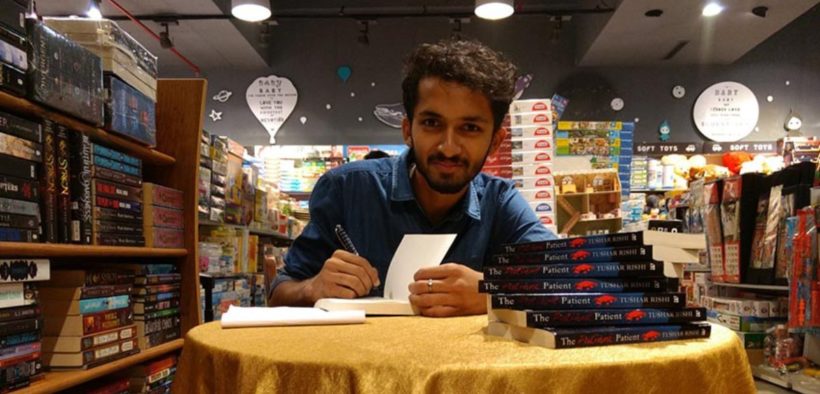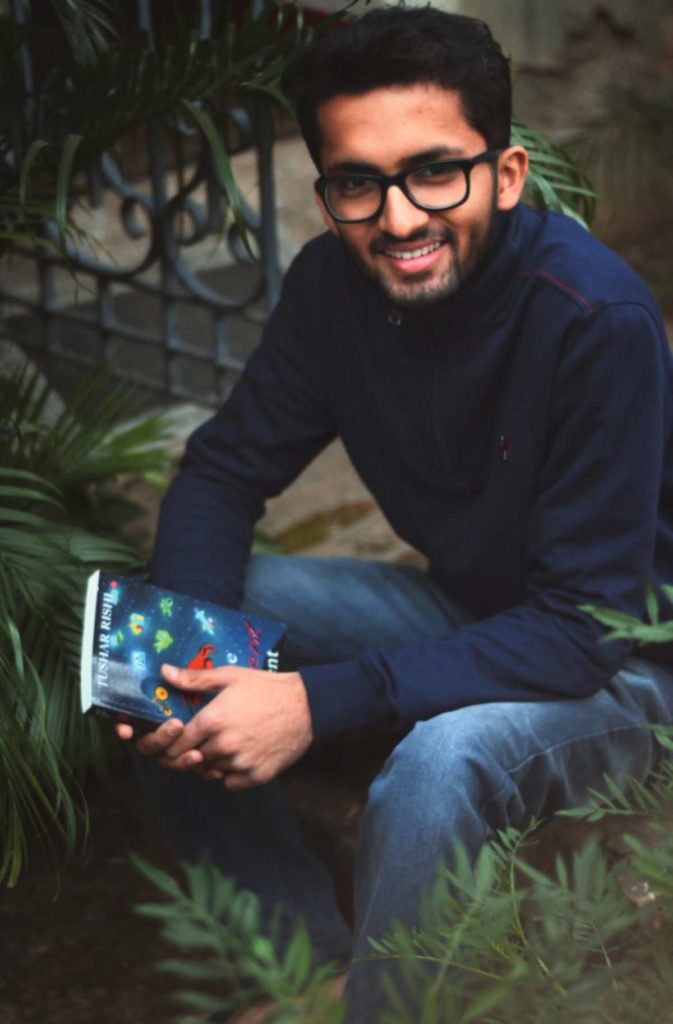The Patient Patient

Chatting with Tushar Rishi, who is all of 20 years, but with a maturity and resilience far beyond his years, was inspiring and thought-provoking. The soft-spoken literature graduate, who has written The Patient Patient, has emerged stronger after his ordeal of fighting cancer. Four months short of his sixteenth birthday, Tushar began an arduous journey of overcoming cancer, when he ought to have been enjoying a long summer vacation after the tenth standard board exams. Excerpts from a conversation:
BY Anila Mathew Vivek

When were you diagnosed with cancer?
I was diagnosed in January 2014. I was 15 at the time. I had been having pain in my left knee for about six months. But since I was into sports, we ignored it, thinking it to be a minor injury. In January, just before my Board exams, I had to miss school for some days because of the pain. And there was some swelling also. In small towns like Ranchi, there is not much awareness about cancer and quick diagnosis is not possible. But luckily, the doctor we approached for my knee pain, saw that something was wrong and he referred us to AIIMS, Delhi.
What were your thoughts on being diagnosed?
Obviously, I thought of it as a death sentence because that’s how it is shown in popular culture. In the beginning, I wasn’t that depressed. But when the chemo started finally in February, I became very depressed because it was physically shattering and mentally taxing. I had to miss my boards and school. So that was bad. For two or three months I was in complete isolation. I wouldn’t talk to people at all. For three or four rounds of chemo, I was alone.
What were the side effects of the treatment
Obviously, the basic side effects like hair fall, nausea, and feeling lethargic all the time. Also, I felt a lot of mental effects. I don’t know if it is common but I would get irritated frequently. I would stop talking to people. I had to change my eating habits and so on.
What were your coping mechanisms during this testing time?
I always loved reading and writing as a child. I started reading books to pass time in the hospital, and then I started writing my own diary. The first two months, I was a little depressed but afterward, I started coping with it in a much better way. But in my case, one important thing that helped was that I got treated in Delhi, where many of my family members stay. So I was with my mother and my father would go to and fro from Delhi to Ranchi juggling between my treatment and his job (Tushar’s father works in the Jharkhand government service). My mother had to leave her job for one year for my treatment. (His mother is a professor at the Birla Institute of Technology). So we stayed at our uncle’s place. My family members never let me feel like I was a patient or anything. They tried to be happy in front of me, behaved as normally as possible. So when I was feeling up to it, we even went to the movies. So that is how it is. When people around you support you, you can get through anything.
Could you tell us a bit more about your support system?
My support system comprises my mother, my father, my brother (who is in class 11 now) and my uncle (my mother’s brother). They made sure I was not alone or felt depressed. Because when you are alone you tend to get sad thoughts. Even if they were not in Delhi, they used to call me every other day and talk to me. A lot of friends stopped texting me and got on with their lives and I was left behind. But some people stayed in touch. Like my best friends, who never let me feel like I was not part of their crowd. I had to take a year off from school and gave my tenth class exams after a year.
How did the book come about?
During my treatment, I read a few cancer autobiographies, like Lance Armstrong’s autobiography It’s Not About the Bike: My Journey Back To Life and Yuvraj Singh’s autobiography, The Test of My Life. They sort of inspired me to tell my own story because these people were celebrities and they had a different kind of treatment experience. I had my treatment in AIIMS, which was in no way similar to their experience (chuckles). For instance, we used to wait for eight hours to get chemo done. So I decided to write about that. I had been writing my diary during my treatment, maybe once a week or so. So after I returned to Ranchi after my treatment and after I completed my board exams, I started writing my book, and it, fortunately, got published.
What are your dreams now? Have they changed pre- and post-cancer?
Before cancer, I only had this faint hope to become a writer. But that was very distant because coming from a background like mine, becoming a writer is quite a distant dream. The culture is more about science and medicine. In classes nine and ten I was going for IIT coaching too. The environment here is not very conducive to creative arts. After cancer, I just decided that if I have got this life again, like sort of a second chance, I would invest it just the way I want to. So I took up literature in college. Back then my dream was to do something creative if not become a writer. But now I am more definite about following my dream, which is to become a novelist or a writer.
What are your future academic plans?
Definitely, an MA, though I haven’t decided in which area. I am interested in journalism also since it is reporting from the ground about real experiences and I am also interested in English literature and creative writing types.
What is the worst aspect of cancer according to you?
There are a lot of bad aspects. But I feel sometimes the treatment is more shattering than the disease. It completely breaks you, leaves you nothing. And even after the treatment is over, you have to rebuild yourself physically and emotionally as well. When I used to attend cancer support group meetings I did share my experience of having sudden flashbacks while sitting in class after I rejoined school. It may not happen to every cancer patient but it did happen to me. So the emotional trauma was real and still exists. Even now, I have to go for follow-ups every four or six months and the memories keep getting refreshed though I have learned to cope with it a little better. It is also, in a way, very liberating because once you fight it you know that you can do anything if you put your heart in it.
What would you like to tell others suffering from cancer?
I would advise them to try and keep themselves busy. For instance, if you had a hobby that you were unable to pursue, take it up now… play the guitar… watch more movies… try to enjoy the treatment… I know it’s easy to say but you can really do it if you are with the right people. If you have the right support system, you can really enjoy the treatment also. My father used to joke a lot during my environment. So you have to create a positive environment around you.
“MY FAMILY MEMBERS NEVER LET ME FEEL LIKE I WAS A PATIENT OR ANYTHING. THEY TRIED TO BE HAPPY IN FRONT OF ME, BEHAVED AS NORMALLY AS POSSIBLE. SO WHEN I WAS FEELING UP TO IT, WE EVEN WENT TO THE MOVIES. SO THAT IS HOW IT IS. WHEN PEOPLE AROUND YOU SUPPORT YOU, YOU CAN GET THROUGH ANYTHING.”
Tushar Rishi
Writer
Also read about
Decoding The Numbers
Screening In Your Pocket
















